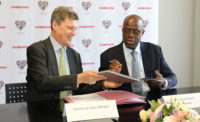
Cadbury is again working to include consumers in its cocoa sustainability efforts. For the third year in a row, the company will allow Canadian shoppers to help donate bicycles to Ghana.
Shoppers are able to collect virtual bicycle parts by entering online UPC codes from any participating Cadbury chocolate, gum, candy or cough product. Each UPC code equals one virtual part, and once 100 virtual parts are assembled into a virtual bike, a real bike - specially designed for the rugged terrain of rural Ghana - is built and ready to be delivered to Ghana.
Aditi Burman, senior promotions manager corporate scale, Kraft Canada, said the program has delivered more than 9,000 bikes to children in remote communities since 2009.
“The overwhelming support we’ve received from Canadians is remarkable and we are so excited to see the results of our collective efforts again this year,” he says. “The Cadbury Bicycle Factory represents our ongoing support of cocoa growing communities in Ghana.”
Cadbury works closely with international associations and local partners on the ground in Africa to ensure effective distribution of the bicycles and each community receives training and tools to ensure that the bikes remain a sustainable and valuable resource, says Kraft Foods, which owns Cadbury.
Cadbury also sent two honorary “factory workers” - bloggers Darius Basher of Toronoo and Rebecca Bollwitt from Vancouver - to Ghana to experience the Cadbury Bicycle Factory first-hand. They helped deliver more than 4,000 of the bicycles assembled form the 2010 program.
“Here in Vancouver we may take bicycles for granted - either renting tandems for a cruise around the sea wall, or cursing a road closure to allow for the construction of a bike lane,” says Bollwitt. “However, in the Ghanaian villages it means so much more. Children can now travel further and faster to school, giving them the opportunity to earn an education and making their hopes and dreams come true.”
The bicycle initiative is part of The Cadbury Cocoa Partnership, which was established together with the United Nations Development Programme, local governments, farmers and communities. It is the largest sustainable cocoa farming program in existence, says Kraft Foods.
The Partnership is meant to secure the economic, social and environmental sustainability of one million cocoa farmers and their communities in Ghana, India, Indonesia and the Caribbean.
For more information visit http://www.thebicyclefactory.ca.


